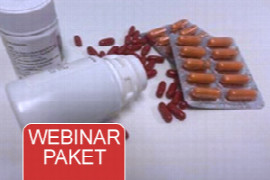Webinar Paket - Toxikologie
(inkl. USt.)
In diesem Webinar Bundle haben wir vier Toxikologie Webinare von Hendrik Lehmann, Dipl. ACVECC zusammengefasst und als Bonus gibt es das englische Webinar "Toxicology – Treatment and management of paracetamol and recreational drugs" mit Dr. Corrin Boyd gratis dazu.
Webinar 1: Allgemeines zur Toxikologie sowie unspezifische Therapie
Intoxikationen gehören zu den häufigsten Gründen für eine Vorstellung von Hund und Katze als Notfall in der Kleintierpraxis. Diese können bei Kleintierpatienten zu lebensbedrohlichen Situationen führen.
Webinar 2: Die häufigsten Giftstoffe in der Umwelt
Trotz umfangreicher Aufklärung und Vorsichtsmaßnahmen kommt es immer wieder zu Vergiftungen durch Rodentizide oder Mulescoide. Aber auch Frostschutzmittelvergiftungen kommen immer wieder vor. Dieses Webinar soll auf die häufigsten Vergiftungen im Garten oder Umwelt eingehen.
Webinar 3: Vergiftungen durch Medikamente und Drogen
Nicht selten kommen Hunde und Katzen in Kontakt mit medizinischen Präparaten, was uns hilft kann für unsere Patienten tödlich sein. Dieses Webinar soll auf die häufigsten Vergiftungen durch Medikamente und auch Drogen und auf deren Behandlung eingehen.
Webinar 4: Giftige Nahrungsmittel
Obwohl inzwischen den meisten Besitzern klar ist, dass Schokolade kein Leckerli für Hunde ist, kommt es immer wieder versehentlich zu Schokoladenvergiftungen. Aber das ist nicht das einzige Lebensmittel das für Hunde giftig ist.
Webinar 5: Treatment and management of paracetamol and recreational drugs
Ingestion of human medications and recreational drugs is a common occurrence in small animal practice. There are myriad clinical presentations of toxicosis. This webinar will cover some of the most common clinical syndromes. This includes tips on when to suspect toxicosis is a likely differential diagnosis. Emerging recreational drugs such as synthetic cannabinoids and amphetamines will be highlighted. General principles of treatment will be discussed. Where there are specific treatment options these will be discussed. However, the bulk of treatment is supportive. Decontamination and non-specific treatments will be discussed, with a focus on emerging treatments such as intravenous lipid emulsion. Extracorporeal therapies, an emerging referral option, will also be briefly discussed. Providing good symptomatic care will also be highlighted, focussing on fluid and pharmacologic management. This webinar will cover several case examples.

Hendrik Lehmann, Dipl. ACVECC
- Seit 2019: Oberarzt Intensivstation Klinik für Kleintiere der JLUGießen
- Juli &November 2018: Externship Emergency and Critical Care Service Vetsuisse Bern, CH
- November 2017: Externship Emergency and Critical Care Service Cornell, USA
- Oktober 2017: Teilnahme am ersten Cardiopulmonary Bootcamp Cornell University, NY, USA
- 2016-2018: Resident American College of Veterinary Emergency and Critical Care unter der Leitung von Frau Dr. med vet E. Haßdenteufel DACVECC, DECVECC
- 2014 - 2015: Rotating Internship an der Kleintierklinik der Vetmeduni Vienna, AT
- 2007 - 2014: Diplomstudium Vetmeduni Wien

Dr. Corrin Boyd, BSc BVMS(Hons) GradDipEd MVetClinStud MANZCVS, DACVECC
Dr Boyd is a criticalist employed as Senior Lecturer in Emergency and Critical Care at The Animal Hospital at Murdoch University. He is also a PhD candidate at Murdoch University, researching the adverse effects of fluid therapy products, with a focus on synthetic colloids. He graduated from Murdoch University in 2009. He remained at Murdoch working as a staff veterinarian in the Emergency and Critical Care service, before completing an internship (2013) and residency (2014-2017) in Emergency and Critical Care. He achieved ACVECC diplomate status in 2017. He also was awarded a Graduate Diploma of Education and Master of Veterinary Clinical Studies during this training. His main research interests include shock and fluid resuscitation, especially synthetic colloids, and their adverse effects on coagulation and kidney function. Other interests include congenital coagulopathies, kidney injury biomarkers, extracorporeal therapies, anaphylaxis, enteropathogens, patient anxiety and sleep patterns in the ICU, use of technology in ECC and ethics in ECC.



